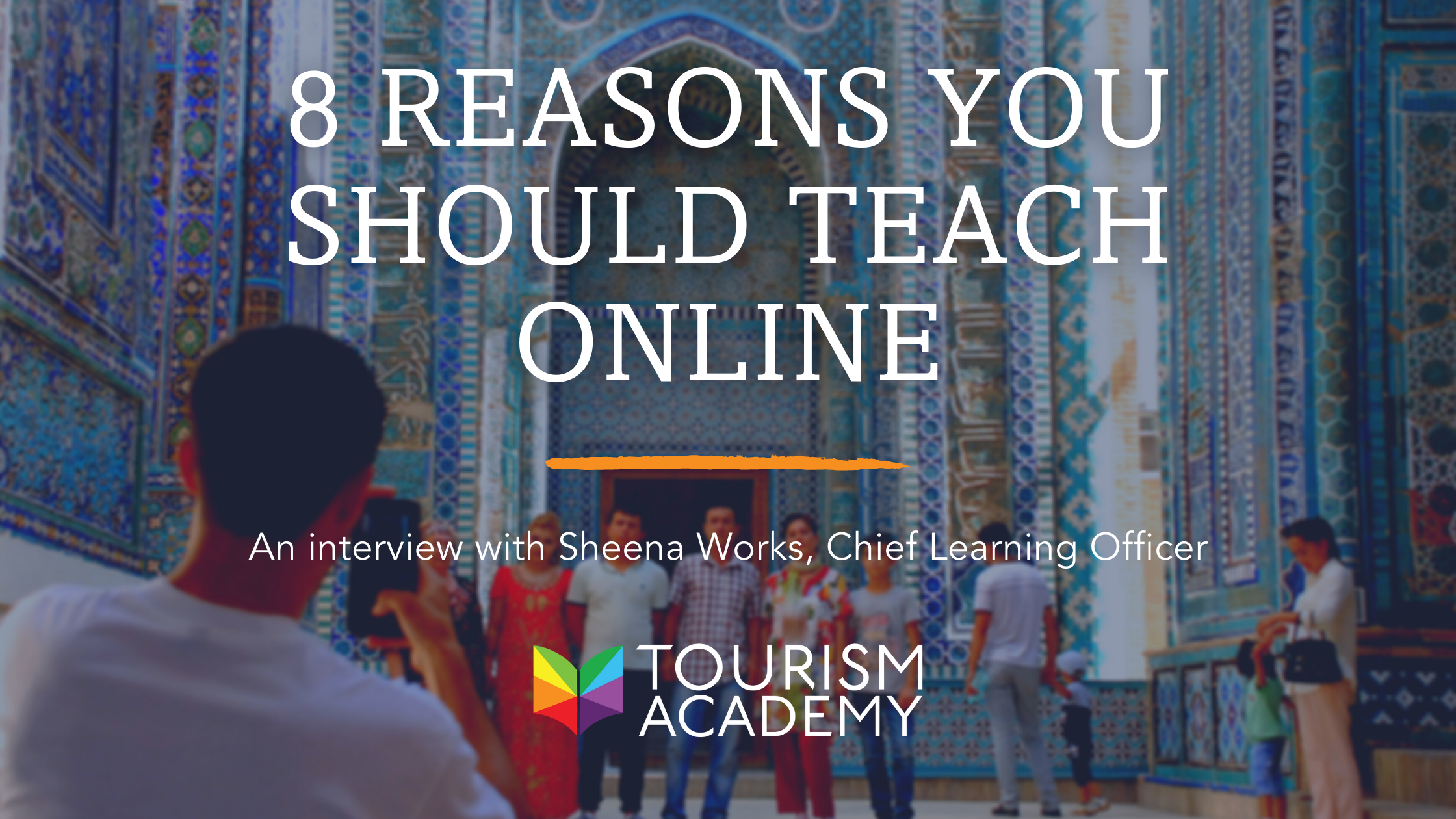
8 Reasons to Teach Online Courses to Tourism Professionals
Why should you consider teaching an online course? Can teaching online actually benefit your career prospects, generate leads for your business and even provide passive income? We sat down with Sheena Works, Chief Learning Officer at The Tourism Academy who shared some of her thoughts. She offered these 8 benefits she's seen from her experience teaching, building and evaluating hundreds of online courses including those here at The Tourism Academy. Take a look.
1 - Passive Income
The market for online courses has more than doubled in the last four years and is expected to exceed $1 trillion in the near future. People are capitalizing on the rise of online courses and turning their knowledge into passive revenue-generating machines. Self-paced courses make it easy for instructors to create and deliver content that students can access and engage with anytime, freeing themselves up to enjoy life and earn money instead of being stuck in a classroom on someone else's schedule.
2 - Increase Your Reach
My first online course was taught to a limited group of professionals within a rapidly growing technology company. Much of that same content is now available online to professionals around the globe. I'm excited to teach online because of how it advances my own goal to increase access to quality education.
There are countless reasons why traditional classroom learning just doesn't fit in with the life circumstances faced by professionals - timing, distance, cost, family or work obligations - the list goes on. The Tourism Academy makes valuable content accessible to 200,000+ travel professionals around the globe when they are ready, engaged and available.
3 - Collaborate With Colleagues
A key benefit of online learning is that it provides both the students and the instructors with a safe space to share ideas. Experts from around the globe can come together to co-create courses. During the COVID 19 outbreak, instructors teaching health, safety and sanitation became found an entirely new audience with lodging, transportation, dining and destination partners who needed content quickly.
4 - Self Discovery
Students learn best when they can design their own learning experience; we call this self discovery. Students can now learn at their own pace, according to their own interests and preferences. Students are free to utilize course resources and materials to meet the way they learn. In this way, students are more excited to learn and find it much easier to discover lessons than traditional classroom instruction. Without pressure to perform in front of an audience daily, instructors become free to engage with students, provide needed guidance and feedback.
5 - Transform In-Person Training
Those who go through the trouble of creating a training program, course or workshop can offer that program again and again without much (if any) additional effort. Online courses serve as refreshers and resource libraries for those who might have attended in person. Students who love the course can share it with their own teams with a hyperlink. We've also seen instructors who deliver an entire course online before students can register for a coaching session or in person event that focuses on concept application.
6 - On Demand Learning
Traditional education for professionals requires that a student be available at a certain time on a certain day in a certain place. Those who can't make the lecture are typically left behind or, in the case of product training, miss out on the content entirely. That's just not the case with self-paced learning. An inspired student in Australia can start (and sometimes finish) a course while the instructor is asleep on the other side of the globe. Students can speed up or slow down their progression to match their own rates of comprehension, even watching lectures again if they feel they missed something.Certification and credential programs that used to be spread out over months of face-to-face meetings can now be completed in just hours or days - helping to keep interested people engaged, excited and eager for more. These same courses were once only accessible to the business leaders can now be shared with front line staff, promoting industry growth and leadership funnels.
7 - A Model For Innovation
Online courses give instructors valuable feedback on how students are doing, when they might be struggling and what content does best. Great teachers learn to adjust their delivery, curriculum and content to meet the needs of students. If students don't finish the entire video lecture, cut it up into more easily digestible clips with engagement points and varying content between. The Tourism Academy allows for the cross pollination of ideas and course materials meaning that the course you create for one organization can be picked up and shared through another private academy.
8 - Define Your Reputation
Teaching online helps boost your professional visibility. Being selected to teach at The Tourism Academy puts your name, bio and knowledge on stage in front of the industry's greatest minds, around the globe. Students and instructors can connect through course message boards, projects and comments. Online courses are also a great tool for showcasing your talent and making it easy for prospective clients to experience your value proposition first hand, helping you land that next big contract.
BONUS - Anyone Can Teach
You are the best at what you do and you're probably already teaching others. This online learning format and our unique adult learning support team help remove many of the obstacles that stand between the expert and the audience. At The Tourism Academy, we continue to learn and innovate every day. We're excited to share what we're learning with you.


Leave a comment